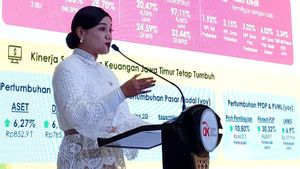JAKARTA - Indonesian Center of Reform on Economics (CORE) Economics (CORE) researcher Yusuf R Manilet said strengthening regulations and providing incentives to banks could increase the distribution of financing to micro, small and medium enterprises (MSMEs).
"In general, I think strengthening regulations such as Bank Indonesia Regulation (PBI) Number 17 of 2015, which requires banks to provide credit of at least 20 percent of their total credit to MSMEs, can be a good starting point," Yusuf said, quoted from Antara, Wednesday, December 11.
As is known, the Financial Services Authority (OJK) stated that there is still a funding gap for micro, small and medium enterprises (MSMEs) of IDR 2,400 trillion.
In addition, he said incentives such as tax reduction, interest subsidies, or credit guarantees need to be given to reduce banking risk.
"These steps not only increase banking confidence in the MSME sector, but also encourage greater financing allocations," he said.
Furthermore, Yusuf said that to increase the distribution of financing to MSMEs, it is necessary to increase MSME access to various formal financial products and services, including business credit, micro loans, and sharia financing.
"Especially for Islamic financial services, the potential for sharia banking must be utilized to provide affordable and comprehensive financing solutions, ranging from access to capital to marketing," he said.
On the other hand, financial literacy among MSME players needs to be improved through training and education on financial management, business planning, and risk management.
The move not only helps MSMEs manage finances more effectively, but also increases their awareness of available financial products.
According to him, the knowledge and empathy gap between MSMEs and financial institutions is also a significant obstacle. MSME actors also need to get adequate education about financial services including the features in them, so they can make use of them optimally.
"This synergy is expected to be able to create a better relationship between MSMEs and financial institutions," said Yusuf.
In addition, increasing MSME competitiveness and operational efficiency is also a priority. Access to digital banking services, such as mobile banking and electronic payments, can help MSMEs manage their finances better.
"This technology allows MSME players to track cash flows in real-time, manage inventory more effectively, and make more strategic business decisions," he said.
SEE ALSO:
Furthermore, the government needs to strengthen the network and market access which is an important element in empowering MSMEs. The government can play a major role by facilitating cooperation between MSMEs and various parties, including financial institutions, business associations, and e-commerce platforms.
"With wider access to local and international markets, MSMEs can increase production capacity and expand their business reach," he said.
These efforts are expected to be made to encourage an increase in the allocation of financing to MSMEs so as to reduce the gap in funding needs for MSMEs.
The English, Chinese, Japanese, Arabic, and French versions are automatically generated by the AI. So there may still be inaccuracies in translating, please always see Indonesian as our main language. (system supported by DigitalSiber.id)















